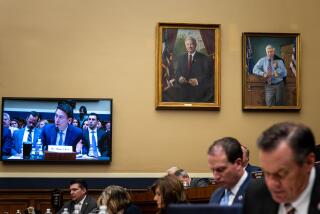Some Chinese Are Reading U.S. Letter for What It Is
- Share via
BEIJING — As a student at the University of Foreign Studies here, Zhang Lili is proficient in English and use of the Internet.
Those skills have given her a window that most Chinese do not have on the recent standoff over the collision of an American spy plane and a Chinese fighter jet: Zhang was able to find, and read, a copy of the original letter that the U.S. sent Beijing to bring an end to the dispute.
What she discovered was a statement that Washington was “very sorry” for the likely death of the Chinese fighter pilot and for the unauthorized landing of the U.S. plane at a Chinese air base minutes after the April 1 midair collision. What wasn’t included were words that would indicate a flat-out apology for the accident, which the Chinese government had demanded and the U.S. had refused to give.
State-run media have called the letter an apology anyway. And the Communist regime has translated the letter into Chinese using words that could connote deeper regret and a greater admission of wrongdoing than Washington’s own Chinese-language version.
“It’s all a word game,” Zhang, 25, said scornfully. “It’s a face-saving gesture. . . . By saying ‘sorry,’ [President] Bush climbed down.
“The Chinese translation saved Jiang’s face,” she added, referring to Chinese President Jiang Zemin.
Chemistry teacher Li Chen was harsher. “The Chinese government is cheating,” he declared Friday.
As the digital age engulfs China, authorities have had more difficulty in exerting the total control over information that they enjoyed in the not-too-distant past.
The Internet, especially, has given young, educated Chinese access to news and information previously unavailable--including the original U.S. letter that ended the stalemate and prompted the release of the Navy EP-3 reconnaissance plane’s 24-member crew Thursday after 11 days of detention in southern China.
The original text has not been reproduced in any major English-language newspapers in China.
A senior U.S. diplomat here revealed Friday that the final wording of the letter--the subject of hours of diplomatic wrangling--was negotiated entirely in English, which is not standard practice.
Although an official interpreter was present at the final meeting between Assistant Foreign Minister Zhou Wenzhong and U.S. Ambassador Joseph W. Prueher, Zhou launched the discussions in English, and the rest of the conversation followed suit, the diplomat said.
The exclusive use of English was not at either side’s insistence, the diplomat said. But by agreeing only upon an English text, the Chinese government was free to issue its own translation--and massage it to fit its political needs.
“We wrote a letter that is factually accurate and something that I think we can live with in the long haul,” said the diplomat, who requested anonymity. “It was also a letter that the Chinese felt they could use. . . . [It allowed] a little more wiggle room.”
The Beijing regime’s translation differs from the Chinese-language version issued by the U.S. Embassy. The Chinese government’s rendering uses terms for “very sorry” that some readers could interpret as more apologetic than the American version.
Yet not even the Chinese government’s version uses the stronger term of apology, daoqian, that Beijing had insisted on.
That hasn’t stopped the state-run media from using daoqian in their characterizations, if not quotations, of Washington’s statements.
Hearing the original English version confirmed for Li, the chemistry teacher, that China did not get what it had asked for.
“Jiang is so stupid,” he said. “If there’s an English version of the letter out there, I don’t know how many Chinese people would really believe the Chinese media.”
Even basing their judgment on Chinese media reports alone, plenty of residents already blame Beijing for backing down in the standoff, despite the best efforts of the government’s huge propaganda machine.
An upsurge of nationalism in recent years, promoted by the government itself, means that many see the Communist regime as having come out of the confrontation with the U.S. looking weak. Nationalism is particularly notable among young people, who also are the ones more likely to use the Internet, understand English and get access to a copy of the original U.S. letter of regret--a volatile combination.
Wang Rui, a 30-year-old trading company employee who saw the English version, castigated Beijing for caving, saying the move set a dangerous precedent.
“It’s a total failure by the Chinese government,” said Wang. “If you back down once, then you’ll always have to back down.”
In the eyes of many residents who follow the regime’s lead, this doesn’t absolve the U.S. of blame in the accident.
English teacher Li Haihong said Washington’s letter was not as serious and humble as it should have been.
“Native English speakers know the difference between ‘sorry’ and ‘apologize,’ ” she said. “The U.S. is just not sincere enough.”
More to Read
Sign up for Essential California
The most important California stories and recommendations in your inbox every morning.
You may occasionally receive promotional content from the Los Angeles Times.














